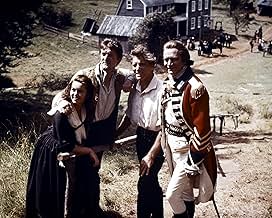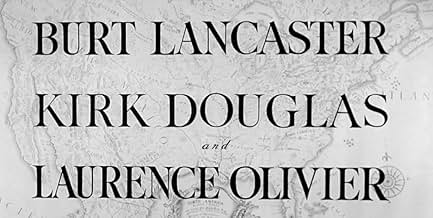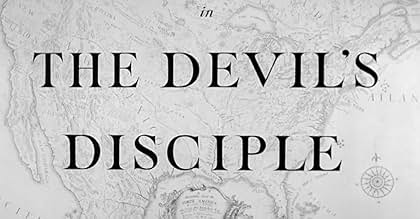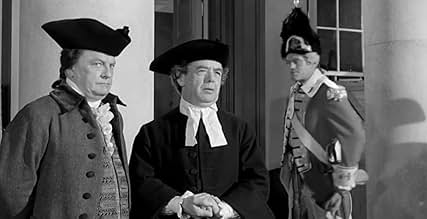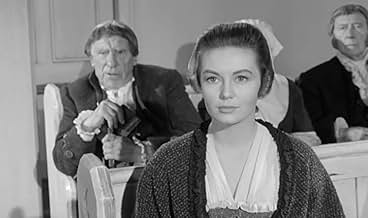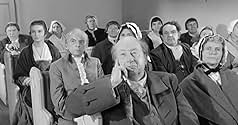IMDb RATING
6.9/10
3.1K
YOUR RATING
The black sheep of a family and the local minister discover their true vocations during the Revolutionary War.The black sheep of a family and the local minister discover their true vocations during the Revolutionary War.The black sheep of a family and the local minister discover their true vocations during the Revolutionary War.
- Directors
- Writers
- Stars
- Nominated for 1 BAFTA Award
- 1 nomination total
Neil McCallum
- Christie Dudgeon
- (as Neil Mc Callum)
Joe Beckett
- British Officer
- (uncredited)
Steven Berkoff
- British Corporal
- (uncredited)
- Directors
- Writers
- All cast & crew
- Production, box office & more at IMDbPro
Featured reviews
Burt Lancaster and Kirk Douglas shared a chemistry -- offscreen as well as on screen -- which was rare even by Hollywood standards. There's a legend about them, as a matter of fact (and I'd hate to think it apocryphal), that -- at the onset of each of the many films in which they co-starred -- they flipped a coin to see who would play which role.
In their film adaptation of George Bernard Shaw's "The Devil's Disciple," the coin-flip would have been at best symbolic -- or perhaps ironic is the term here -- inasmuch as the plotline concerns role reversals and identity switching. Set during the closing days of the American revolution, Dick Dudgeon, the town rakehell (Douglas), having previously admitted to Reverend Anderson, the local minister (Lancaster), "Pastor, there's something about you I respect, and that makes me want you for my enemy," allows himself to be mistakenly arrested as that minister by British troops. It's an act which even he, at the time, is at a loss to explain. While Dudgeon keeps the local British commandant, General Burgoyne (Laurence Olivier in what turns out to be one of his finer screen performances), alternately amused and bemused, Reverend Anderson discovers within himself a call to action as he rallies the rebel troops to rescue Dudgeon and to cut off Burgoyne's reinforcements.
Purists may note that the film adaptation tampers with Shaw's more typically cynical resolution in the original stage presentation (yes, it is much more 'upbeat' and true to the Hollywood dicta of the day) . . . and yet the Shavian quality of the dialogue between Dudgeon and Anderson -- not to mention the barbed repartee between Dudgeon and Burgoyne -- is preserved virtually intact here. It is also brilliantly rendered by all parties.
Although Douglas manages to 'steal' much of this film, Lancaster affords us more than a glimpse of the ability which will, in little more than another year, garner him an Oscar -- for 'Elmer Gantry'-- (and put an end to the yearly ritual of his and Douglas' comedic "It's So Great Not To Be Nominated" performance at the awards ceremonies).
One of Hollywood's more successful adaptations of a stage play, this is also a film which, more than most, stands the test of time.
In their film adaptation of George Bernard Shaw's "The Devil's Disciple," the coin-flip would have been at best symbolic -- or perhaps ironic is the term here -- inasmuch as the plotline concerns role reversals and identity switching. Set during the closing days of the American revolution, Dick Dudgeon, the town rakehell (Douglas), having previously admitted to Reverend Anderson, the local minister (Lancaster), "Pastor, there's something about you I respect, and that makes me want you for my enemy," allows himself to be mistakenly arrested as that minister by British troops. It's an act which even he, at the time, is at a loss to explain. While Dudgeon keeps the local British commandant, General Burgoyne (Laurence Olivier in what turns out to be one of his finer screen performances), alternately amused and bemused, Reverend Anderson discovers within himself a call to action as he rallies the rebel troops to rescue Dudgeon and to cut off Burgoyne's reinforcements.
Purists may note that the film adaptation tampers with Shaw's more typically cynical resolution in the original stage presentation (yes, it is much more 'upbeat' and true to the Hollywood dicta of the day) . . . and yet the Shavian quality of the dialogue between Dudgeon and Anderson -- not to mention the barbed repartee between Dudgeon and Burgoyne -- is preserved virtually intact here. It is also brilliantly rendered by all parties.
Although Douglas manages to 'steal' much of this film, Lancaster affords us more than a glimpse of the ability which will, in little more than another year, garner him an Oscar -- for 'Elmer Gantry'-- (and put an end to the yearly ritual of his and Douglas' comedic "It's So Great Not To Be Nominated" performance at the awards ceremonies).
One of Hollywood's more successful adaptations of a stage play, this is also a film which, more than most, stands the test of time.
There is little point denying that the greatest dramatist in England in the 20th Century was George Bernard Shaw. He was a great wit, and he had a view of society that he felt needed expressing in one play after another. But there was something irritating about him that has prevented him from overtaking Shakespeare in drama writing: His desire to give his views on this societal problem or that one led to polemics taking over his writings, so that the plays, even when good, can be uneven. He also displayed a monstrous ego at times that did not deserve to be admired or applauded by the public for most of his ninety three or four years.
In 1897 he had only a handful of plays that had been produced to show his talents: WIDOWERS HOUSE and MRS. WARREN'S PROFESSION were the best of these, and the second had been banned by the Lord Chamberlain's office for treating the subject of prostitution as a business. He decided to do a play with one of London's leading actor managers of the time: Mr. William Terris. But while negotiating with Terris to appear in this play. a madman stabbed Terris to death. Looking around for another actor, Shaw contacted Mr. Richard Mansfield, thus beginning a brief business relationship with that stage star. Mansfield produced THE DEVIL'S DESCIPLE in America, where it was a big success (Mansfield also played Dick Dudgeon).
Shaw was looking at good and evil in the play, with Dudgeon being an anti-religious type who was cynical. But Dudgeon demonstrates a sense of right and wrong and compassion that is missing from the other characters in the play, making the title very ironic - Dick may boast of worshiping the Devil, but he never hurts anyone. In the play, because of his fast life style, the local Puritanical townspeople (especially his mother) disapprove of him, and all but ostracize him. Then his father's will is read, and they realize he is rich (and the other heirs, especially his mother are poor). Since they are hypocrites, the lucky break for Dick makes them even more vicious toward him (his mother cursing him before she dies). So far so good for Shaw.
As I said, the play begins well, and continues fine - introducing high comedy when General Burgoyne appears. Burgoyne was a dramatist too, so Shaw liked him. And here the play (and movie's) problems begin to be felt. Shaw was writing the play in a period that the Whig historians, like George Otto Trevelyan, wrote the history of the American Revolution. Trevelyan's books became best sellers, and were well researched. But he wrote of the Revolution as the backdrop of English Revolutionary spirit as well. To Trevelyan, the English lost the war due to the ineptitude of the Tory regime of Lord North. One example of this was the story of how General Burgoyne's brilliant plan to split the northern colonies in half and conquer both halves one at a time was ruined when the Secretary of State for the Colonies, Lord George Germain, failed to send vital plans to General Sir William Howe to link his men with Burgoyne. Instead, Sir William headed for Philadelphia, which he occupied, and heard nothing about Burgoyne until the latter surrendered in October 1777.
The play builds up to a comic misunderstanding between the British and Dudgeon, whom they arrest thinking he is the Reverend - Dick was alone with the wife of the Reverend at the time, and assumes the latter's personality because he does not want a scandal to break out. Soon the Reverend (who supports the Revolution) faces a court martial, with the whimsical Gentleman Johnny asking questions. Although the result is a foregone conclusion, (the British have already hanged Dick's father as the movie begins), Burgoyne is annoyed to discover after the verdict is about to be given that Dick is not the Reverend.
This is all in the film, and it still works, especially with Olivier's perfect performance as the British general, who is facing defeat but won't lose his cool about it. But Shaw's source, George Otto Treveylan, is no longer supported by students of history - he is regarded as a Whig who ignored the many errors of his own party, to concentrate on the failures of Lord North and his Tories. One mistake is the story of Lord George Germain's failure to send Sir William Howe his plans, because Lord George felt he had to go on his personal vacation to the country, and would not wait to send out those vital plans. It is not true, after all. Lord George did send Sir William the plans, but Howe ignored them, going out to capture Philadelphia instead.
"History will lie as usual" says Burgoyne to Major Swindon. Ironically, Shaw pushed the lie as truth himself. Now everyone who sees the play or film believes that Lord George Germain's vacation plans lost the Revolution. Not really. The forests of upper New York State, the lack of good roads, the immense supply train played vital, the vigor of Benedict Arnold as an American general led to Burgoyne's surrender. But that was not as amusing as Lord George Germain's "failure" to send the vital plans. One recalls the end of John Ford's LIBERTY VALANCE: When given a chance to print the truth of the legend, print the legend!
In 1897 he had only a handful of plays that had been produced to show his talents: WIDOWERS HOUSE and MRS. WARREN'S PROFESSION were the best of these, and the second had been banned by the Lord Chamberlain's office for treating the subject of prostitution as a business. He decided to do a play with one of London's leading actor managers of the time: Mr. William Terris. But while negotiating with Terris to appear in this play. a madman stabbed Terris to death. Looking around for another actor, Shaw contacted Mr. Richard Mansfield, thus beginning a brief business relationship with that stage star. Mansfield produced THE DEVIL'S DESCIPLE in America, where it was a big success (Mansfield also played Dick Dudgeon).
Shaw was looking at good and evil in the play, with Dudgeon being an anti-religious type who was cynical. But Dudgeon demonstrates a sense of right and wrong and compassion that is missing from the other characters in the play, making the title very ironic - Dick may boast of worshiping the Devil, but he never hurts anyone. In the play, because of his fast life style, the local Puritanical townspeople (especially his mother) disapprove of him, and all but ostracize him. Then his father's will is read, and they realize he is rich (and the other heirs, especially his mother are poor). Since they are hypocrites, the lucky break for Dick makes them even more vicious toward him (his mother cursing him before she dies). So far so good for Shaw.
As I said, the play begins well, and continues fine - introducing high comedy when General Burgoyne appears. Burgoyne was a dramatist too, so Shaw liked him. And here the play (and movie's) problems begin to be felt. Shaw was writing the play in a period that the Whig historians, like George Otto Trevelyan, wrote the history of the American Revolution. Trevelyan's books became best sellers, and were well researched. But he wrote of the Revolution as the backdrop of English Revolutionary spirit as well. To Trevelyan, the English lost the war due to the ineptitude of the Tory regime of Lord North. One example of this was the story of how General Burgoyne's brilliant plan to split the northern colonies in half and conquer both halves one at a time was ruined when the Secretary of State for the Colonies, Lord George Germain, failed to send vital plans to General Sir William Howe to link his men with Burgoyne. Instead, Sir William headed for Philadelphia, which he occupied, and heard nothing about Burgoyne until the latter surrendered in October 1777.
The play builds up to a comic misunderstanding between the British and Dudgeon, whom they arrest thinking he is the Reverend - Dick was alone with the wife of the Reverend at the time, and assumes the latter's personality because he does not want a scandal to break out. Soon the Reverend (who supports the Revolution) faces a court martial, with the whimsical Gentleman Johnny asking questions. Although the result is a foregone conclusion, (the British have already hanged Dick's father as the movie begins), Burgoyne is annoyed to discover after the verdict is about to be given that Dick is not the Reverend.
This is all in the film, and it still works, especially with Olivier's perfect performance as the British general, who is facing defeat but won't lose his cool about it. But Shaw's source, George Otto Treveylan, is no longer supported by students of history - he is regarded as a Whig who ignored the many errors of his own party, to concentrate on the failures of Lord North and his Tories. One mistake is the story of Lord George Germain's failure to send Sir William Howe his plans, because Lord George felt he had to go on his personal vacation to the country, and would not wait to send out those vital plans. It is not true, after all. Lord George did send Sir William the plans, but Howe ignored them, going out to capture Philadelphia instead.
"History will lie as usual" says Burgoyne to Major Swindon. Ironically, Shaw pushed the lie as truth himself. Now everyone who sees the play or film believes that Lord George Germain's vacation plans lost the Revolution. Not really. The forests of upper New York State, the lack of good roads, the immense supply train played vital, the vigor of Benedict Arnold as an American general led to Burgoyne's surrender. But that was not as amusing as Lord George Germain's "failure" to send the vital plans. One recalls the end of John Ford's LIBERTY VALANCE: When given a chance to print the truth of the legend, print the legend!
Laurence Olivier is a British general surrounded by mediocrity and outnumbered by rebel forces who won't give him a fair fight. Burt Lancaster is a pacifist minister trying to protect his innocent parishioners, most of whom haven't yet taken any side in the Revolutionary War. Kirk Douglas is a bright-eyed ne'er-do-well, interested only in himself. Put three great actors like this together and you're bound to get great results, right?
Wrong. I completely fail to see how this movie can get such good reviews here. The first 50 minutes of the movie just barely avoid being downright awful. Olivier and Lancaster do next to nothing, while Douglas hams it up so bad that even the audience should feel embarrassed. Janette Scott, as Lancaster's wife, is forced to play a character with no discernible intelligence or personality whatsoever.
Have some patience, however, and you will eventually be rewarded. Lancaster and Douglas both experience sudden character changes. Lancaster gets a chance to be entertaining while Douglas' performance becomes excellent once he tones it down a bit. Allowed finally to interact with these two, Olivier becomes a valuable asset. The resulting 30 minutes is a high-spirited action adventure film with a light comedic touch and occasional witty dialogue. With the handicap of the terrible start, however, this is still nothing more than a pleasant but unremarkable diversion.
Wrong. I completely fail to see how this movie can get such good reviews here. The first 50 minutes of the movie just barely avoid being downright awful. Olivier and Lancaster do next to nothing, while Douglas hams it up so bad that even the audience should feel embarrassed. Janette Scott, as Lancaster's wife, is forced to play a character with no discernible intelligence or personality whatsoever.
Have some patience, however, and you will eventually be rewarded. Lancaster and Douglas both experience sudden character changes. Lancaster gets a chance to be entertaining while Douglas' performance becomes excellent once he tones it down a bit. Allowed finally to interact with these two, Olivier becomes a valuable asset. The resulting 30 minutes is a high-spirited action adventure film with a light comedic touch and occasional witty dialogue. With the handicap of the terrible start, however, this is still nothing more than a pleasant but unremarkable diversion.
Oddly enough, very few good films have been made about The American revolution, and this is one of them.Kirk Douglas and Burt Lancaster put in very fine performances, with Lancaster acting against type as the priggish, self-righteous minister who transforms himself into a dashing, wickedly, hero, and Kirk Douglas as the sardonic, cynical, Satanic, selfish, and utterly delightful Dick Dudgeon, who transforms himself inot an altruistic, self sacrificing hero. Laurence Oliviers performance is little too langourous and flat, until he delivers the films great punch-line, "history will lie, as usual." Of course, it may be that the films sharp-eyed, toughly ironic view of the revolution has militated against it ever gaining the popularity it deserves
Sparkling adaptation of George Bernard Shaw's witty play set in American's revolutionary war. It has everything; a wonderful script (most of Shaw's play is let be), lively direction, and a top-notch cast. Kirk Douglas gives his lightest and most charming performance as the self-professed Devil's Disciple, there's no trace of the usual heavy-handed ham, he completely steals the film. Burt Lancaster doesn't have as much to work with in the part of a virtuous minister, but he does what he can and I consider a man who looks that great to be above criticism.
The only disappointment is Laurence Olivier as General Burgoyne. Olivier castigated himself in his autobiography for botching one of Shaw's most hilarious roles, his personal griefs were overwhelming him at the time. He's nervous and unfocused, line after wonderful line falls flat. (He returned to form shortly after in "Spartacus" and "The Entertainer")
So, this isn't just a fun film that can be enjoyed by any level of sophistication, it's something every film buff has to see... A movie where Kirk Douglas acts rings around Laurence Olivier!!! Surely the stars must have fallen out of the sky in pure shock!
The only disappointment is Laurence Olivier as General Burgoyne. Olivier castigated himself in his autobiography for botching one of Shaw's most hilarious roles, his personal griefs were overwhelming him at the time. He's nervous and unfocused, line after wonderful line falls flat. (He returned to form shortly after in "Spartacus" and "The Entertainer")
So, this isn't just a fun film that can be enjoyed by any level of sophistication, it's something every film buff has to see... A movie where Kirk Douglas acts rings around Laurence Olivier!!! Surely the stars must have fallen out of the sky in pure shock!
Did you know
- TriviaThe character of The Reverend Anthony Anderson was loosely based on the historical figure of Peter Muhlenberg, known as the "Fighting Parson of the American Revolution".
- GoofsSeveral times while going through the forest, the British refer to "snipers." However, the term sniper didn't come into being until about 40 years after the American Revolutionary War. The term came into usage in 1824, while the war ended in 1783.
- Quotes
Major Swindon: What will history say, sir?
General John Burgoyne: History, sir, will tell lies, as usual!
- Crazy creditsThe opening credits appear over a map of North America during the Revolutionary War, which then zooms into an animated battle played out by paper models.
- ConnectionsReferenced in Un numéro du tonnerre (1960)
- SoundtracksYankee Doodle
(uncredited)
traditional 18th Century Anglo-American folk song
Heard under main title
- How long is The Devil's Disciple?Powered by Alexa
Details
- Release date
- Countries of origin
- Language
- Also known as
- Le Disciple du diable
- Filming locations
- Production companies
- See more company credits at IMDbPro
Box office
- Budget
- $1,500,000 (estimated)
- Runtime1 hour 23 minutes
- Color
- Aspect ratio
- 1.85 : 1
Contribute to this page
Suggest an edit or add missing content



